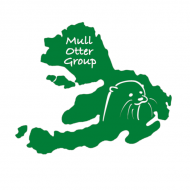Mull Otter Group is a group of otter enthusiasts who have come together in the hope of making life a little better for the otters of Mull. Otters give us so much – they are beautiful creatures to admire, an important part of the island’s ecology, and they benefit the island’s economy by contributing significantly to wildlife tourism. We want to give something back to Mull’s otters.
Primary Objectives
- To assist with the welfare and conservation of Eurasian Otters on the Isle of Mull and Iona.
- To carry out (alone and with others), research and investigation to further our understanding of the biology and ecology of the Eurasian Otter.
- Research includes a five year otter mortality study which involves recovering any otter corpses in a timely manner and transporting to Cardiff University for post mortem.
- To educate local residents and visitors to the island on responsible otter watching, in an effort to prevent disturbance and/or suffering.
- To try and reduce otter road casualties by implementing signage and otter reflectors, clearing culverts and by any other means deemed appropriate.
- To rescue otters in need of assistance, and with the help of SSPCA and IOSF, provide these animals with a suitable rehabilitation package, which may assist their release back into the wild.
Mission Statement
Mull Otter Group is committed to preserving a healthy environment for the benefit of present and future generations of otters on the Isle of Mull and Iona. This we intend to do by promoting positive community awareness through education, information, involvement and greater understanding.
Although a healthy population of otters exist on the Isle of Mull, the Eurasian Otter is still classed on the IUCN red data list as ‘vulnerable.’ The intention of MOG is to work together with the local community, other agencies and visitors to the island to ensure that otters on the island are given the respect that, as wild animals, they deserve. The Eurasian Otter is protected under Schedule 5 and 6 of the Wildlife and Countryside Act (1981), which makes it an offence to kill, injure or take an otter without a license or to undertake work that could damage their habitats.
You can learn more about what we do in more detail below:
Education and Awareness
One of the key aims of Mull Otter Group is to raise the level of awareness of otters and their conservation needs. We have produced information leaflets that are widely available, and have erected information boards at key locations across the island. We also give talks to schools and other groups – please contact us if you are interested in learning more about otters.
Road ‘Otter Crossing’ Warning Signs
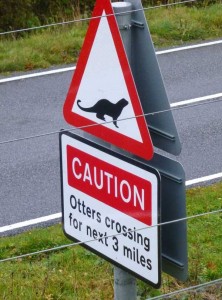 Since the inception of Mull Otter Group we have been working to get permission from the council to install road signs to warn motorists of the possibility of otters crossing. In December we got the go ahead from the council and very soon we will be installing some signs at strategic locations.
Since the inception of Mull Otter Group we have been working to get permission from the council to install road signs to warn motorists of the possibility of otters crossing. In December we got the go ahead from the council and very soon we will be installing some signs at strategic locations.
It is hoped that this will go some way to reducing the number of otter fatalities on Mull’s roads which average at just over two per month currently.
Roadside Reflectors
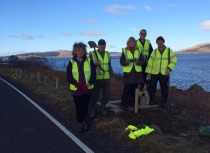 In 2016 we installed some reflectors at the side of the road near the Fishnish timber pier, and at Pennygown. These are designed to reflect the lights of any oncoming vehicle into the eyes of otters considering crossing the road, in the hope that it will make them think twice.
In 2016 we installed some reflectors at the side of the road near the Fishnish timber pier, and at Pennygown. These are designed to reflect the lights of any oncoming vehicle into the eyes of otters considering crossing the road, in the hope that it will make them think twice.
In 2018 we installed more reflectors at Garmony and Ardlussa.
You can read more details about these roadside reflectors and the history of the project by downloading this PDF file: Roadside reflectors
Culvert Clearing
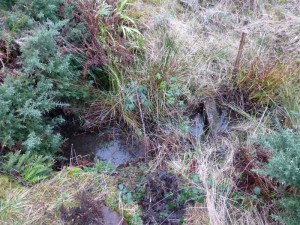
Mull gets its fair share of rain, and that is why there are pipes, called culverts, to carry water underneath the road, so that the road doesn’t flood or gradually get washed away.
Mull’s otters catch the majority of their food in the sea, and need to travel inland to get to their holts and access fresh water for drinking and bathing. This very often means crossing a road, which can result in the otter being run down by a vehicle. But, sometimes otters will use culverts to go underneath the road, which is far safer.
By keeping culverts clear it is hoped that we can help otters avoid road accidents. Please let us know if you ever find a blocked culvert. There are so many that we can’t possibly keep track of them.
Beach Cleaning
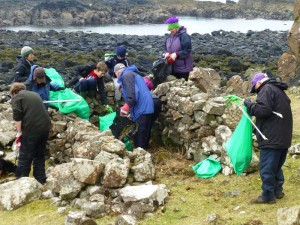
Unfortunately Mull gets more than its fair share of plastic debris washed up the shore line. It is not only unsightly but harmful to wildlife. Larger pieces can be mistaken for food or accidentally ingested, and can even choke animals to death. Worse still – plastic breaks down into microscopic pieces but does not fully biodegrade. This tiny pieces are eaten by plankton and hence enter the food chain for larger animals including humans! It is vital that we clear up as much plastic as we can, which is why Mull Otter Group regularly carry out beach cleans.
Mull Otter Group have recently started an initiative called Mull Adopt-a-Beach which seeks to expand this work and coordinate it with the other organisations on the island that carry out beach cleans. We are looking for individuals to adopt a stretch of coast near them and commit to cleaning it regularly – even if it is just half a mile, and even if it is just once a year.
Want to join in? Then click here to find out about beach cleaning events and how to adopt a beach of your own.
Scientific Studies
Mull Otter Group are currently carrying out a 5 year mortality study. We hope to share some results from this study soon. Post mortem data will prove valuable in identifying the risks facing otters and could lead to increased knowledge of how to protect them.
In 2014/15 we helped an MSc student from Glasgow University conduct some research into otters and in particular their use of culvert. The results were presented at the 2015 AGM and concluded that otters do use culverts to cross roads, but unfortunately not all the time, and so it important to keep culverts clear and do what we can to reduce collisions with vehicles should otters decide to not to use them.
